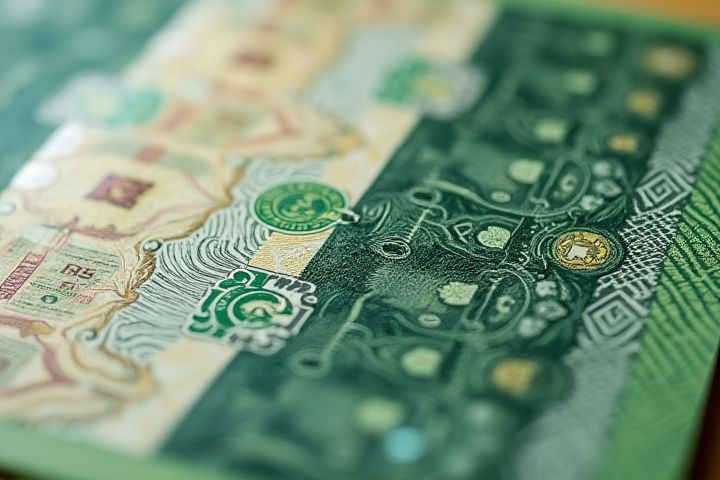
As of late 2023, Nigeria's national debt hovers around 77 trillion Naira, reflecting the country's increasing borrowing to finance infrastructure and public services. The debt-to-GDP ratio stands at approximately 40%, indicating a manageable level compared to many other countries. Major lenders include international financial institutions, domestic investors, and bilateral creditors, which shapes Nigeria's economic landscape. The government allocates a significant portion of its budget to debt servicing, impacting fiscal stability and development initiatives. Monitoring these financial dynamics is crucial for understanding Nigeria's economic growth prospects and investment opportunities.
Total debt amount
As of October 2023, Nigeria's total national debt is approximately 77 trillion naira, which translates to around $184 billion. This considerable debt includes both domestic and foreign borrowings, with a significant portion attributed to financing infrastructure projects and stimulating economic growth. The debt-to-GDP ratio stands at about 30%, indicating a moderate level of debt concerning the country's overall economic output. You should stay informed about these financial metrics, as they significantly impact Nigeria's economic stability and development prospects.
External vs. domestic debt ratio
Nigeria's national debt has seen a significant increase, with a clear distinction between external and domestic debt. As of October 2023, approximately 39% of Nigeria's total debt is categorized as external, largely consisting of loans from international financial institutions and foreign governments. Conversely, domestic debt constitutes about 61%, primarily raised through treasury bills and bonds within the local financial market. This growing ratio highlights the reliance on domestic financing to support government expenditures and infrastructure projects while balancing external obligations.
Major lenders or creditors
Nigeria's national debt, exceeding $99 billion as of 2023, is significantly influenced by major creditors including multilateral institutions like the World Bank and the International Monetary Fund (IMF). Additionally, bilateral loans from countries such as China and Japan contribute substantially to Nigeria's financial obligations. The domestic debt market, with a notable portion of Nigerian government bonds held by local investors, also plays a crucial role in the national debt landscape. Understanding the composition of these debts provides insight into Nigeria's economic challenges and fiscal sustainability.
Debt servicing cost
Nigeria's national debt has surged dramatically, primarily due to increasing borrowing to finance budget deficits and infrastructure projects. As of 2023, the debt servicing cost has become a significant portion of the national expenditure, consuming over 70% of the government's revenue, which raises concerns about fiscal sustainability. This rising debt burden imposes constraints on essential public services and development initiatives, leading to a challenging economic environment. You should be aware that the escalating debt servicing costs necessitate urgent reforms in economic management and revenue generation strategies to ensure long-term stability.
Impact on national budget
Nigeria's national debt significantly influences its national budget, constraining funds available for essential services such as education, healthcare, and infrastructure. A substantial portion of the budget is allocated to debt servicing, often exceeding allocations for crucial sectors, which hampers economic growth and development. High debt levels lead to increased borrowing costs, affecting the government's ability to invest in public welfare and create job opportunities. As Nigeria navigates fiscal challenges, managing national debt becomes vital for ensuring a balanced budget that meets the needs of its citizens.
Debt-to-GDP ratio
Nigeria's national debt, as of 2023, stands at approximately $100 billion, resulting in a Debt-to-GDP ratio of around 35%. This ratio reflects the proportion of the country's total debt in relation to its gross domestic product, indicating the economy's ability to repay. Rising debt levels can raise concerns about fiscal sustainability, especially when compared to the average rate of emerging economies. Investors and policymakers closely monitor this metric, as a stable or declining Debt-to-GDP ratio can enhance economic confidence and attract foreign investment.
Government borrowing policies
Nigeria's national debt has surged due to various government borrowing policies aimed at funding infrastructure development and social programs. The country has relied heavily on both domestic and foreign loans, with an increasing portion allocated to servicing existing debt rather than on new investments. Recent fiscal strategies emphasize the need for fiscal consolidation and have prompted the government to explore alternative financing sources, such as public-private partnerships. You should be aware that this growing debt poses risks to Nigeria's economy, as high borrowing costs could impact future economic growth and sustainability.
Economic growth influence
Nigeria's national debt, which stood at approximately $100 billion as of late 2023, significantly impacts its economic growth trajectory. The rising debt levels can strain public finances, limiting funds available for essential services such as healthcare, education, and infrastructure development. A substantial portion of Nigeria's budget is allocated to servicing debt, diverting resources away from investment opportunities that could stimulate economic expansion. By managing debt sustainably and investing wisely, your country can foster a more conducive environment for growth, attracting foreign investment and enhancing overall productivity.
Currency implications
Nigeria's national debt, primarily denominated in both local currency (Naira) and foreign currencies, has significant implications for the economy. As of late 2023, the rising debt levels have led to increased pressure on the Naira, contributing to currency depreciation and inflationary pressures. This situation affects government spending, with a larger portion of revenue allocated to debt servicing rather than essential services and infrastructure development. For your financial decisions, understanding the trends in Nigeria's national debt can inform investment strategies and risk assessments in both domestic and international markets.
Debt sustainability strategies
Nigeria's national debt has been a topic of increasing concern, particularly regarding its sustainability and the measures taken to address it. The government has implemented debt sustainability strategies aimed at optimizing fiscal management and ensuring that borrowing aligns with economic growth. These strategies involve enhancing revenue generation through tax reforms, improving public financial management, and prioritizing expenditures that stimulate growth, such as infrastructure development. By focusing on these areas, Nigeria aims to minimize the risk of debt distress while fostering a stable economic environment for future generations.
